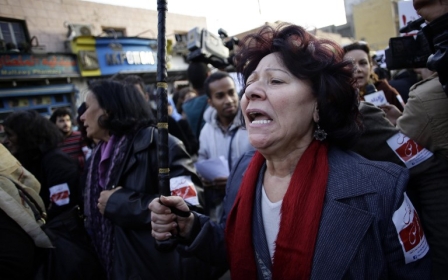Egyptian academic says he was sacked for opposing university role in arrests

An Egyptian academic has claimed he was sacked from his post at a high-profile university for opposing the institution’s policy of supporting the arrest of students and professors.
Ahmed Abdel-Basit, a teaching assistant in Cairo University’s physics department, was dismissed by university administration on Wednesday after accusing his employers of helping to crack down on anti-government opposition on campus.
Abdel-Basit has worked in the physics department for eight years, and is head of a movement called “Free Egyptian University,” which aims to “achieve independence for Egypt’s universities”.
In a statement released on Thursday, Abdel-Basit wrote that he had voiced his opposition to the university administration “out of my strong belief in a free country where freedom, justice and equality are safeguarded for all”.
The university said he had been dismissed for “participating in stirring up violence on campus”.
The administration denied what it said were “rumours” that he had been sacked for his behaviour off-campus, including his participation in the 2013 Rabaa sit-in by supporters of the now-banned Muslim Brotherhood that ended in the deaths of hundreds of people.
Abdel-Basit’s dismissal came days after Emad Shahin, a well-respected Egyptian academic and professor of public policy, was sentenced to death along with dozens of other defendants.
Shahin, who left Egypt for the US in 2014, was sentenced in absentia for his alleged role in “espionage”, accused of conspiring with armed groups like Hezbollah and Hamas to destabilise the country.
In a column for the Atlantic published on Wednesday, Shahin described life as an anti-government academic in Egypt.
“My research and writing described – in uncomfortable detail – the military government’s harsh policies of exclusion,” he wrote.
As a result, he says, Egyptian authorities sought to portray him as “a treasonous and evil figure without Egypt’s best interests in mind”.
According to Free Egyptian University, which does not make public its affiliations, there are now 233 academics imprisoned throughout the country.
A legal amendment that came into force in January 2015 allows university staff and academics to be dismissed for participating in "violent acts" or doing work related to political parties on-campus.
Middle East Eye propose une couverture et une analyse indépendantes et incomparables du Moyen-Orient, de l’Afrique du Nord et d’autres régions du monde. Pour en savoir plus sur la reprise de ce contenu et les frais qui s’appliquent, veuillez remplir ce formulaire [en anglais]. Pour en savoir plus sur MEE, cliquez ici [en anglais].




